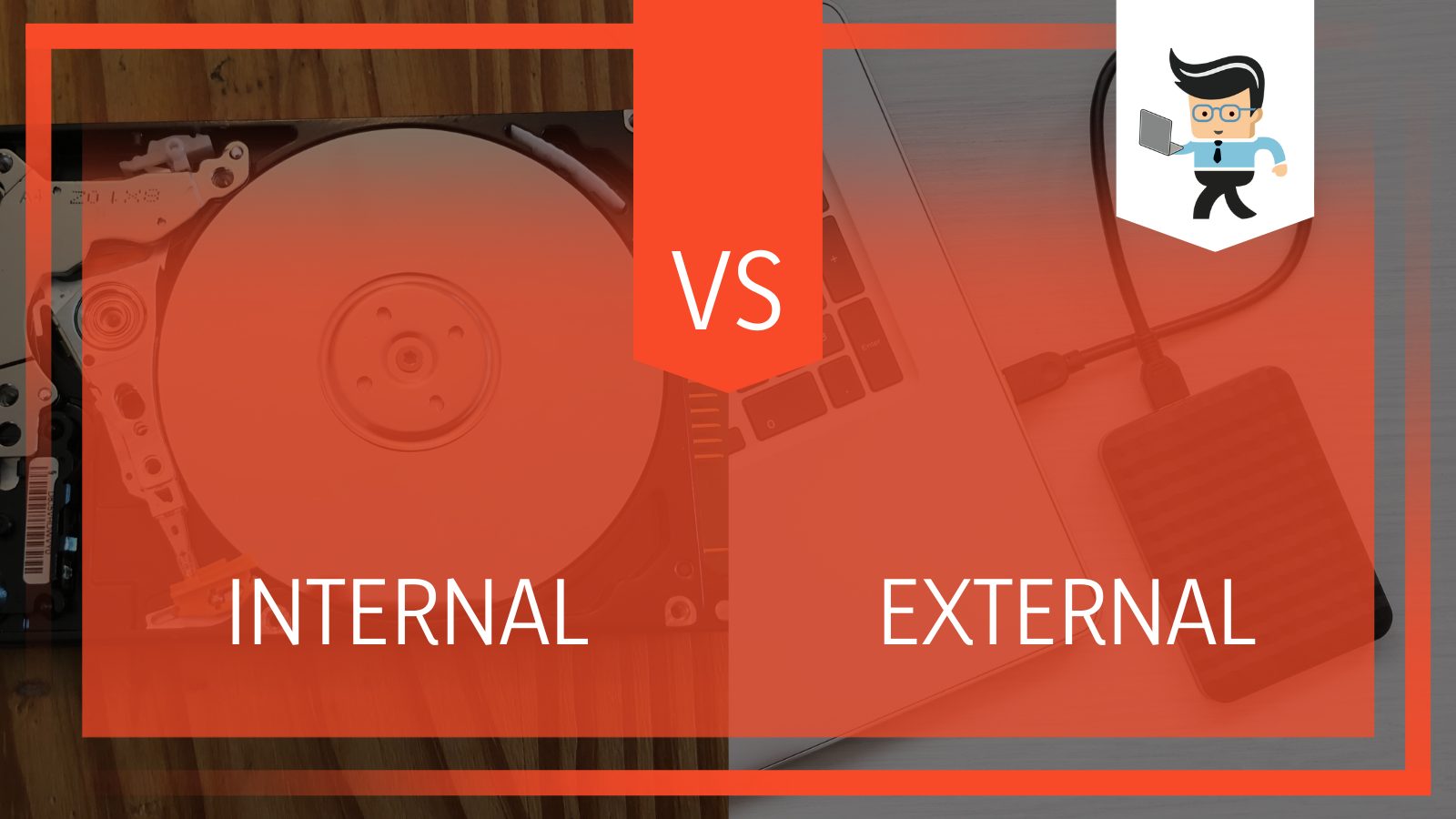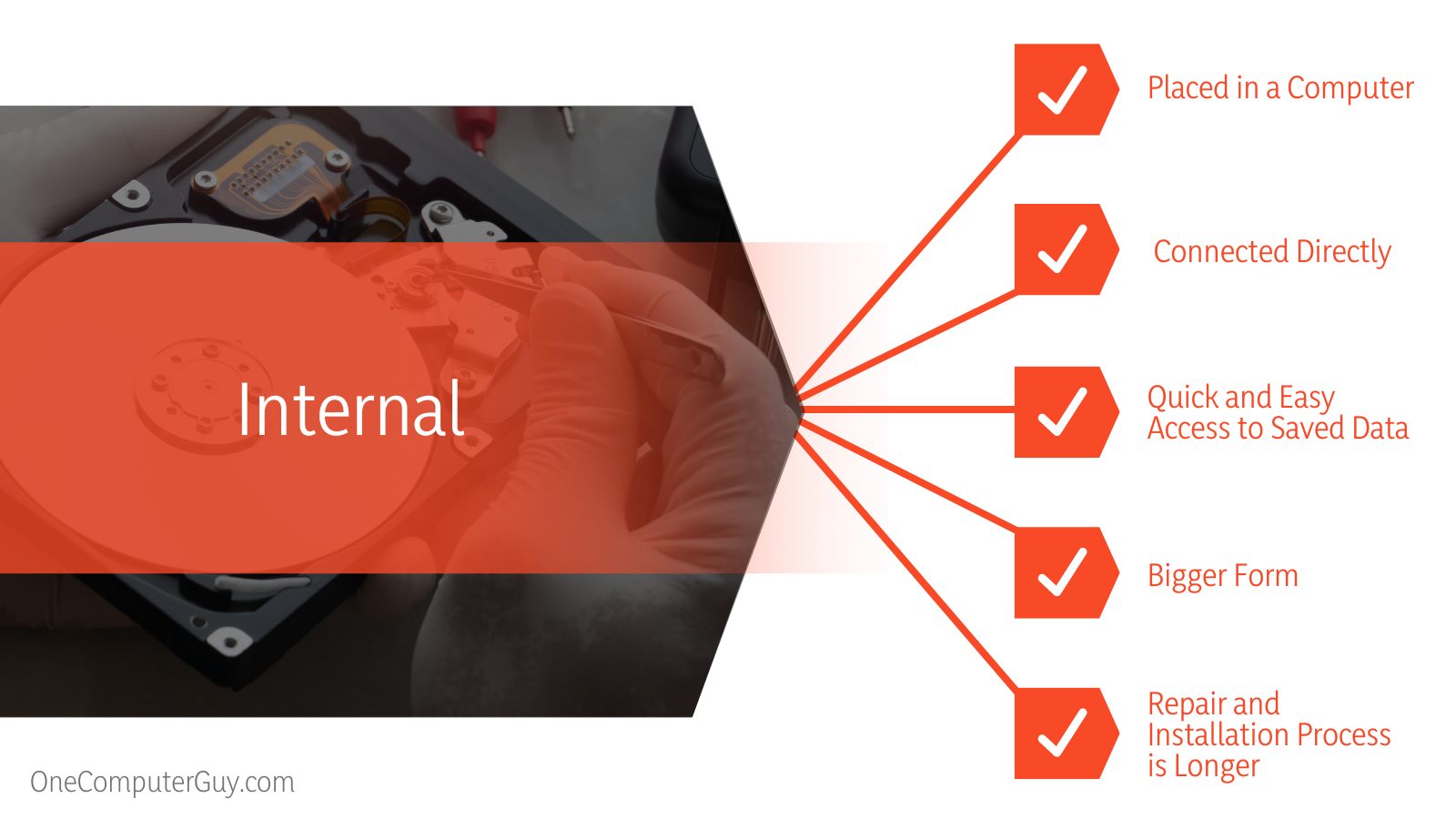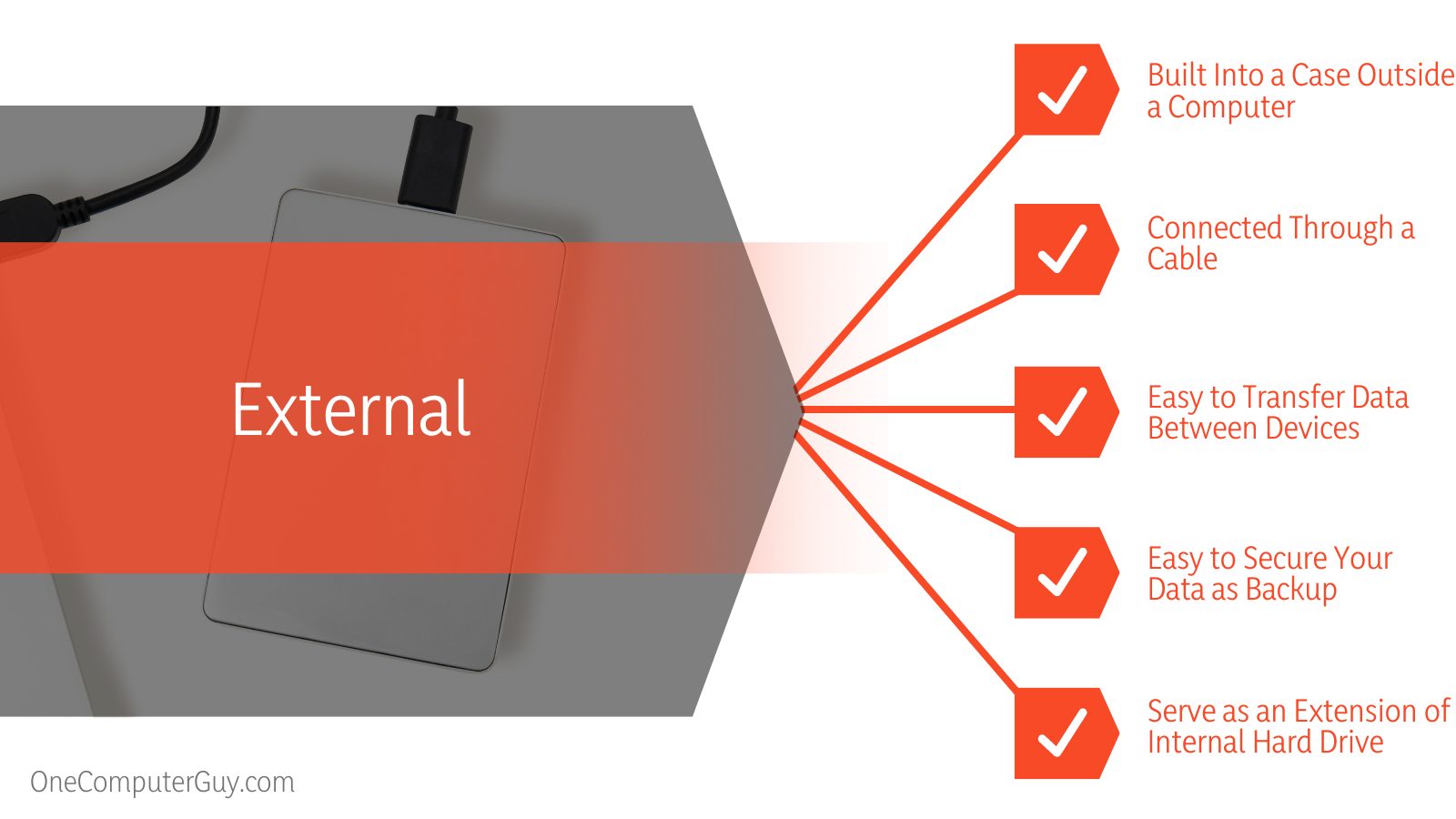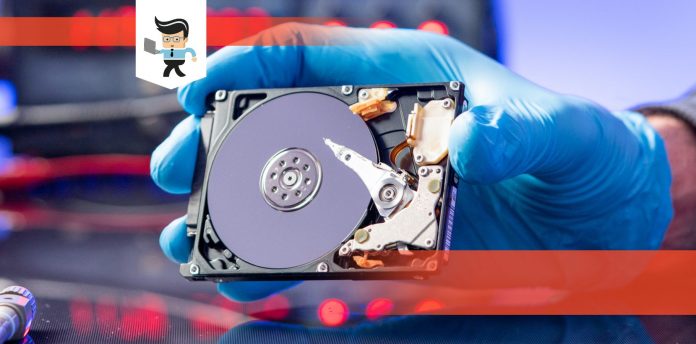Choosing between an internal vs. external hard drive for your PC can be a tad difficult. While external hard drives are great for storing and moving files, internal hard drives are considered to be the best for quick and easy access.
 Both storage types have their pros and cons and depending on your PC build, one is bound to be more ideal than the other. In this article, we’ll walk you through the knowledge of our computer experts, providing you with enough information to help you make the right choice.
Both storage types have their pros and cons and depending on your PC build, one is bound to be more ideal than the other. In this article, we’ll walk you through the knowledge of our computer experts, providing you with enough information to help you make the right choice.
Contents
Internal vs. External Hard Drives Explained
Internal and external hard drives are essential to the functionality of a computer. Hard drives are storage devices that allow you to save and retrieve data on your computer.
From files to programs and games, you can store a wide range of data on your hard drive. Moreover, when building or upgrading a PC, knowing the ideal type of hard drive to work with can help improve the functionality and aesthetics of your computer.
What Is an Internal Hard Drive?
An internal hard drive is often found in a computer. When you open your windows file explorer, the local drive or drive associated with (C:) is your internal hard drive.
The main role of the hard drive is to help you store files and programs on your computer and make them readily accessible to you as soon as you turn on your PC. Everything you save, download, and install on your PC is stored on your internal hard drive.
Internal hard drives come in a variety of storage capacities. You can find the capacity range in your computer’s file explorer as well as your computer manual. For those who build their own PCs, your hard drive capacity will be in its description, often ranging from 32GB to 2TB or more.
Internal hard drives come in two main sizes, including a 3.5-inch drive and a 2.5-inch drive. The three-inch hard drives are commonly found in desktop computers while the 2.5-inch internal hard drives are common in laptops and notebooks.
What Is an External Hard Drive?
Unlike an internal hard drive, an external hard drive, otherwise known as a portable hard drive doesn’t sit in your computer. Instead, it serves as remote storage that can be connected to your PC to help expand or support your internal hard drive. An external hard drive can be connected to multiple devices, removed and kept separately, away from your PC.
Most external hard drives come with high storage capacities, ranging from 64GB to 3TB.
They are often connected to computers via wires, such as a USB cable. External hard drives are often built to stay outside a computer. However, there are drives that are custom-designed to fit inside a computer.
The Difference Between Internal and External Hard Drive
| Features | Internal Hard Drive | External Hard Drive |
| Location | Placed in a computer | Built into a case outside a computer |
| Connection | Connected directly | Connected through a cable |
| Usage | Quick and easy access to your saved data | Easy to:
|
– Location
One of the main differences between an internal and external hard drive is where they are located. As we noted above, internal hard drives are placed in a computer. Most laptops and desktop computers come with internal hard drives to store your OS, files, programs, and data.
On the other hand, external hard drives are outside a computer. They are built into a case to help protect them from shock, drops, dirt, and other factors. However, if you remove an external hard drive from its case, you’re likely to find that it has the same structure as its internal counterpart.
– Connection
Internal hard drives are connected directly to your computer’s motherboard.
On the other hand, external hard drives are connected to a computer through a cable connection, such as a FireWire or USB cable.
– Usage
Both internal and external hard drives are storage devices. However, while internal hard drives tend to provide quick and easy access to your saved data, programs, and operating systems, external hard drives make it easy to transfer data between devices, secure your data as backup, and serve as an extension of your internal hard drive.
Factors To Consider When Choosing Between an Internal and External Hard Drive
The main difference between Internal and External hard drives is, External hard drives are used outside your computer while Internal hard drives are connected directly to a computer’s motherboard.

Below are some of the most important factors that denote the differences between internal and external hard drives:
– Reliability
Hard drives come with varying degrees of reliability and quality, depending on the manufacturer and what they are being used for. How good or well-made your hard drive is, is almost as important as how well it works with your device.
In most cases, you tend to get what you pay for. This means that if you buy a cheap hard drive, you’re likely going to experience reliability and performance issues as many cheap hard drives have a short lifespan.
Be that as it may, external hard drives tend to fail more than internal hard drives. There are many different reasons contributing to this problem.
Firstly, unlike internal hard drives that are located in a computer, external hard drives are outside your computer, making them less secure. This means that external hard drives are more likely to fall from desks, get exposed to physical damage, and have their circuitry damaged.
Also, since external hard drives are connected through wires, they become less useful once their wires are faulty. Lastly, due to their portability, external hard drives are often moved around in pockets, backpacks, bags, etc. with little to no protection. This factor makes them break easily or have their cables become faulty.
– Programming Issues
Many hard drives tend to come with programming issues. However, most of these problems are easy to fix and you can easily get the solutions to their problems with a quick Google search.
For some hard drives, all you may need to do is download a separate software or restart your PC after installation in internal hard drive cases, or after you’ve plugged it into your computer, in external hard drive cases.
However, there are also times when a hard drive might provide technical problems and you may need to consider going through programming forums like StackOverflow.
Note that saving files with integrity issues on a new hard drive can cause it to crash, run slowly, or have performance problems. Therefore, make sure you scan your files with a good antivirus before moving them to your new internal or external hard drive.
– Speed
Internal hard drives are faster than their external counterparts. As we’ve mentioned above, internal hard drives are connected directly to your computer’s motherboard. This connection gives them an edge over external hard drives that are connected via cables like USB.
Although there are USB ports that support faster transfer rates, external hard drives will still experience slower speeds due to interface change. For instance, an external hard drive can be connected to a computer via USB while the other end that’s connected to the drive is SATA. The conversion that happens between both interfaces will cause a bit of latency, thereby reducing the speed of the hard drive.
Since internal hard drives are connected directly to the motherboard, there’s no latency, which allows for a higher transfer rate when compared to external hard drives.
– Form Factor
Most internal hard drives tend to have a bigger form factor than their external counterparts. Their sizes also contribute to why internal hard drives are faster than external hard drives.
The standard speed of most hard drives ranges from 5,400 RPM to 7,200 RPM. Both 3.5-inch and 2.5-inch HDDs support these speeds. However, it’s easier for the bigger 3.5-inch hard drive to reach the maximum speed due to its bigger size and high power consumption rate.
Most internal hard drives range from 2.5 to 3.5 inches. On the other hand, external hard drives are often 2.5 inches HDD encased in SATA to USB enclosures.
– Lifespan
While external hard drives may be susceptible to damages, they offer better longevity due to the fact that they are easy to repair. Unlike internal hard drives, you don’t need to disassemble your whole computer when your hard drive becomes faulty. Simply unplug your drive from the USB port and take it to the repair shop or fix it yourself if you can.
 Internal hard drives being connected to your computer’s motherboard means you’ll have to disassemble your PC to get to the drive. This can cost you both time and money as the repair and installation process will be longer.
Internal hard drives being connected to your computer’s motherboard means you’ll have to disassemble your PC to get to the drive. This can cost you both time and money as the repair and installation process will be longer.
Internal hard drives in desktop computers are often attached to the computer tower while those in laptops are usually embedded underneath the computer casing. While they do enjoy excellent protection from environmental factors and stress, you may need some technical experience to disconnect and remove them for repairs.
– Pricing
There isn’t much difference between internal and external hard drive when it comes to pricing. Depending on the manufacturer and specifications, both drive types are often in the same price range.
You can expect a 1TB external hard drive to be in the same price range as a 1TB internal hard drive from the same manufacturer. With that said, external hard drives tend to get more deals on e-commerce stores when compared to internal hard drives.
As we mentioned earlier, with hard drives, you often get what you pay for. If you buy a cheap hard drive, it may not provide you with the kind of speed, reliability, and tech that comes with those with an expensive price tag. That doesn’t mean there aren’t cheap hard drives that are okay.
If you’re building a PC on a budget or you simply don’t have enough for an expensive hard drive, you can buy a cheap hard drive by carefully researching the drive you want to buy. You can do so by going through the reviews provided by other buyers.
Reading the reviews left by previous buyers will show you the common problems between models and if you luckily find a professional reviewer, you’ll be able to note down the pros and cons of each device.
You don’t want to purchase a hard drive that crashes almost as soon as you purchase it or after you’ve transferred your data into it. Carefully researching a product will save you money and time.
Which Hard Drive Should You Choose for Gaming?
Should you choose an internal or external hard drive for gaming?
The right answer depends on whether you want the drive for performance or storage. If you’re looking to enjoy a smoother performance with no hiccups, an internal hard drive is an ideal option to work with.
You won’t have connection or lag issues. Also, your computer will be able to retrieve necessary components and game data with ease, thereby providing you with excellent performance. When you’re having an intense gaming session, there’ll be no chances of your hard drive falling off, getting disconnected, or getting damaged.
However, if you’re looking to store games and other components, an external hard drive is your best option. External hard drives tend to come with massive storage capabilities and can be easily and consistently upgraded. They can be connected to any computer, which means you can transfer your games and other files and programs easily if you change computers.
Conclusion
We’ve covered a lot of ground on internal vs. external hard drives. Here are some key takeaways to help you make the right buying decision:
- External hard drives are used outside your computer
- Internal hard drives are connected directly to a computer’s motherboard
- External hard drives are connected via cables, such as a USB or FireWire
- Internal hard drives are ideal for better performance while external hard drives are great as extra storage
- Repairing an external hard is less stressful compared to repairing an internal hard drive
- Internal hard drives are more reliable than external hard drives
- Internal hard drives tend to offer better speeds than external hard drives
There’s no wrong answer when choosing between an internal vs. external hard drive. With the tips we’ve provided above, you’ll be able to select the ideal drive for your needs.
If you’re looking to enhance your computer’s storage space, an external hard drive may be all you need, but if what you’re looking for is faster loading times and better performance for your PC, an internal hard drive may be the right choice.







